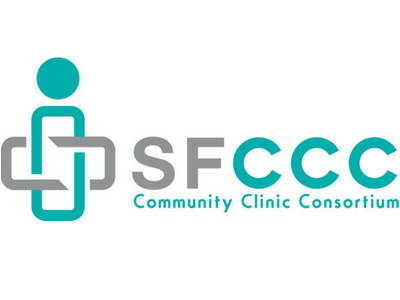NHC SF Member Blog: Community and Listening Ears as Healthcare
Hey everyone! My name is Vivian (she/her), and I’m serving as the Street Medicine and Palliative Care Team Coordinator at the San Francisco Department of Public Health’s Whole Person Integrated Care (WPIC) division. Our main clinic is the Maria X Martinez (MXM) Health Resource Center, a drop-in, low-barrier facility, primarily providing care to folks experiencing or transitioning out of homelessness in San Francisco. The Street Medicine team within WPIC is a diverse team of health workers, peer support specialists, nurses, doctors, and social workers that go on outreach in teamlets across all the neighborhoods in San Francisco, providing wound care, peer support, and resource connection to unhoused folks. Though the team is based out of MXM, you can find me doing outreach around the Tenderloin and SoMa neighborhoods most of the time!
Vivian (right) and another outreach worker (middle) speak with a patient (left).
Along with doing outreach with the Street Medicine team, I also spend half of my week outreaching with the Palliative Care team. WPIC’s Palliative Care team grew out of a need to provide specialized care to unhoused folks with serious and/or terminal illnesses, collaborating with patients to relieve suffering and supporting them by aligning their goals with where they are in their journey of processing their illnesses. We let folks guide the way they envision this portion of their life and what provides them less suffering and more comfort. The places that I most often outreach to patients are permanent supportive housing units, temporary shelter hotels, and on the street. Many patients that are first referred to our team are initially living outside or in a shelter, but will move around to various locations during their duration of care with palliative care. For example, folks may go in and out of the hospital, be relocated to different temporary shelter sites, and then eventually, with the support of our team, get into permanent supportive housing over the course of a few months.
Since many folks experience various barriers to coming to the clinic as well, the flexibility to be able to outreach patients at a variety of sites is very valuable to the care, comfort, and relationships that we are able to build with folks. As an AmeriCorps member on the team, I’ve had the opportunity to support patients in various ways, including accompanying folks to medical or social appointments, connecting them to resources, coordinating care, and helping them complete public benefits forms. Beyond supporting patients with their medical and social needs, the moments that will stick with me the most are visits where I spent anywhere from 30 minutes to over an hour sitting with a patient as they share stories, reflections, and favorite memories from their life.
As my term comes to a close, I’ve been reflecting on the importance of community and how building healthy communities,including having resources and spaces for us to thrive in, is essential for our body, mind, and overall well-being. That's why I think that this work is so important in public health and improving health outcomes in our communities. This has become especially apparent in my role as an AmeriCorps member on the street medicine team, seeing our most at-risk patients often existing in fragile social support systems and experiencing isolation. Unhoused folks and people who use drugs are also subjected to an added layer of stigma and shame, adding to feelings of isolation where they already have a lack of social support and community. Thus, sometimes, the best medicine for folks is often a listening ear, especially while navigating a system where their voices have historically been ignored and oppressed. Providing care through listening, building trust, humanizing stories, and establishing relationships with folks are essential, and often precede staying engaged in healthcare.
I’ve learned that practices, such as accompanying patients to medical appointments that they’re nervous about, exchanging some stories and laughs, or transporting patients to the DMV to get their ID, have the power to be life changing, and even life saving, resources.
About the Author
Vivian Yip (she/her) is one of the 2022-2023 NHC San Francisco AmeriCorps members. She is serving as the Street Medicine and Palliative Care Team Coordinator at the San Francisco Department of Public Health: Whole Person-Integrated Care Team.


